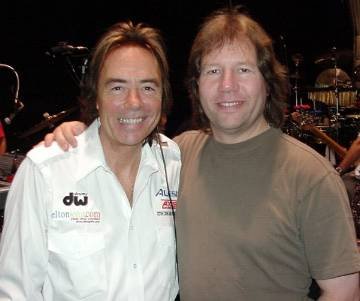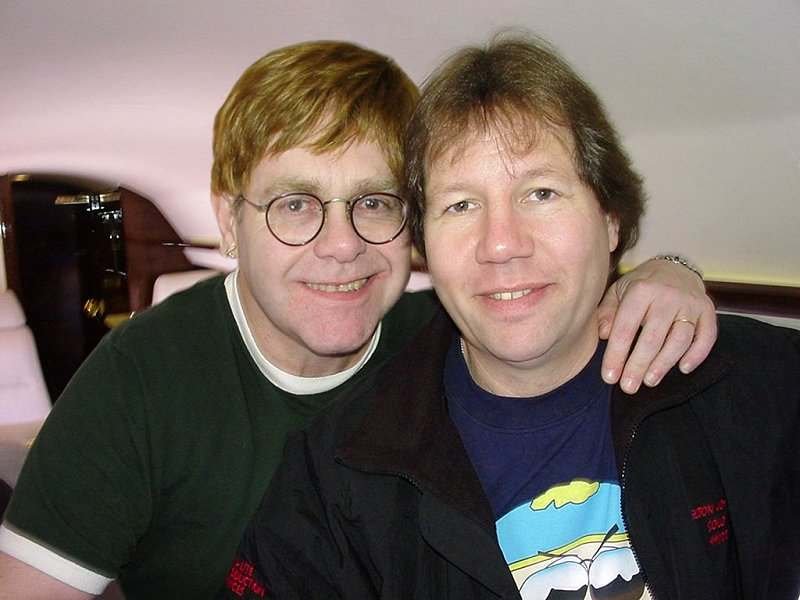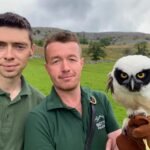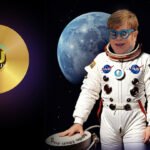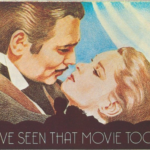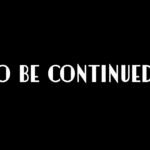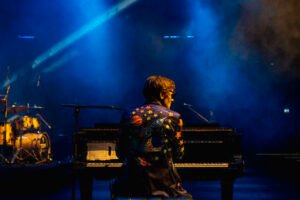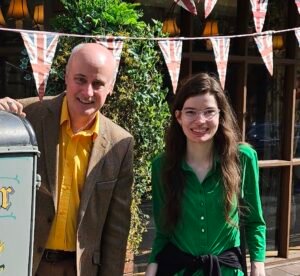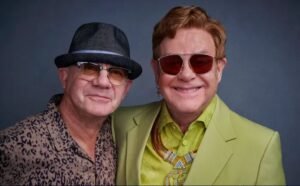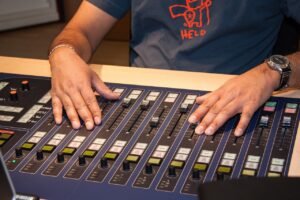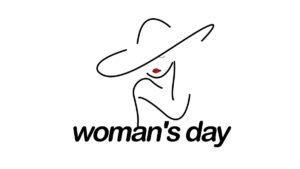 We mine our Elton archives each month to showcase news or features you won’t find anywhere else! Edited by Fran Gilles
We mine our Elton archives each month to showcase news or features you won’t find anywhere else! Edited by Fran Gilles
29/07/2000
By George Matlock
Exclusive interview with Clive Franks Elton’s tour sound engineer (part 2)
By George Matlock
Clive, who was preparing to travel to Liverpool the next day for a special Elton concert, gave George Matlock a full 2 ½-hour interview on 12 July 2000: It’s easy to understand why Clive is genuinely loyal to Elton after nearly 30 years working together. Elton has always been a great help to Clive, professionally and privately, and Clive has had a lot of fun delivering the goods. Clive Franks: Elton’s such a perfectionist. He hates to lose. We used to play backgammon all the time. If he lost, he would not give up until he had won more games than his opponent.
The bond Clive and Elton formed has dissuaded Clive from many temptations.
CF: I’ve had so many offers of work over the years, I’ve never had to go looking, but I’ll always be there for Elton. There was a period a few years ago (late 1980s) when Elton wasn’t touring, and I was concerned ‘I’ve been with him so long, can I do anything else?’ I had a month off and then the phone started ringing. It was actually very good for me to experience some change. The first thing I got into was working for Peter Gabriel. I was a fan of his music. It was similar to Elton’s stuff, but with a lot more dynamics, and very emotional. I loved that tour! He came to an Elton show, and then I got work. After that, Robert Plant came along to a Peter Gabriel show, and I got working for him! Then I was with Elton again, but I got a call from The Who, reforming for a 25th anniversary tour in 1989. I kept calling the office to speak with Elton. Eventually he said ‘go ahead and do it. I’m not touring for a while.’ About two or three days into the tour after weeks of rehearsals I got a call saying Elton’s decided to tour again! I thought ‘now what am I gonna do?’ I’d not missed a tour apart from when my son was born in 1983. So I recommended an engineer from Clair Brothers, the sound company we always use in America since day 1. He did a good job, but Elton was very happy when I came back.
In the summer of 1999, while Elton faced heart pacemaker surgery, Clive’s loyalty was tested by his own health.
CF: Ridiculous! I had an accident with a finger! We’d had a two-month break after what had originally been planned to be a six-week solo tour in 1999 (!) I was excited we were coming to Europe in May, Leeds Castle, and Harewood House. Two days to go, I had my plane tickets, and I was running upstairs at home, slipped, and trying to catch myself I thought I’d broken a finger. It was worse: I tore the tendon right out of the bone. I had to have surgery, and stay home for 8 weeks’ therapy. Unfortunately, it hasn’t healed at all well. It being on the left hand, and me being left-handed, I didn’t do the mid-summer shows. My assistant took over. But it was great to be back for September.
George Matlock: There is a group of people who have been close to Elton over the years.
CF: Yes, apart from me, his personal assistant Bob, and also Brenda, Elton’s late-50s male valet whose been with him 25 years. We all have girls’ names from Elton. I won’t tell you mine, ha! Like Rod Stewart is Phyllis. Elton always feels comfortable to see familiar faces. There are always people who try to get close to the boss, and who later get sussed out and eventually leave. The rest of us love what we do.
GM: Occasionally things go wrong. On September 5, 1999, during Ticking the Police PA sound effect didn’t echo.
CF: Maybe I just forgot to push it up, or I got a call from the stage, like when Elton’s hearing some frequency which is putting him off. But what’s perhaps unusual is that Elton rarely tells me to do anything. I’m left to my own devices, and to decide on the effects. A lot of other bands will listen to tapes, get really involved. I quite like that.
GM: What are your fondest moments?
CF: I have two or three. For Elton and me it must be the moment John Lennon came on stage at Madison Square Garden (MSG, 1974). I’m tingling now, as I speak about it. I was at rehearsals at some studio in New York. It was amazing just to be in the same room, even though as an engineer at Dick James Music, I would see The Beatles, on Northern Songs label which Dick published, regularly. I was even on one of their Christmas records as a party-goer. Every year they produced these silly little floppy singles for the fan club, ha! For some reason they switched from EMI and did the fan thing at Dick James’, a tiny demo studio! They needed a dozen people to create a party scene. I was called in as a youngster. We were given spoons, plates, to make a noise! I can actually hear my voice as I deliberately yelled something, knowing it would get picked up. In 1974 I never told Lennon that I had spoiled his song! Well anyway, Lennon was petrified, because he’d not been on stage since The Beatles disbanded in 1970. He only agreed to it because of the deal he and Elton brokered if Whatever Gets You Through the Night got to number one in US. When Lennon walked out on stage, I’ve never heard a roar go on as long, or as loud. It must have lasted 10 minutes! They played three songs, and that must be the best all-time moment for me.
Clive’s best moment is also allied with the worst, however.
CF: We did eight or nine nights at The Garden (MSG), Lennon came on only the first night. I was on The Beatles nostalgia kick that week and would put on Beatles songs as walking music before and after the show. I had a compilation of Beatles cassettes. I remember the third show we got to the point where we always did Funeral For A Friend, which sadly we cannot really do on the current solo tour. Anyway, in those days (1974) we couldn’t reproduce all those amazing wind sounds at the start of the song. So I used to play the opening from the album on cassette. The stage went totally dark, and the dry ice would pour out. It worked for years. Well on this occasion the lights went down. I hit the tape, and nothing happened! My first reaction was ‘maybe it’s not loud enough, maybe it is playing’ which is ridiculous because I could see where my faders were. So I hit the fader to the top in panic mode, and suddenly, at full volume, so deafening was the start of Hello, Goodbye by The Beatles! I’d forgotten to take out the walking music and put in the correct tape! I just wanted the ground to open up, it was so bloody loud, you couldn’t disguise it. It actually got as far as ‘You say yes, I say …’ and I pulled it out. Now I’m in overload panic mode because the house lights and stage are dark, and I’m trying to find the right cassette! Which I did find. Luckily, Caleb Quaye, who was then in the band and had one of the loudest laughs, cracked up laughing. I could hear him acoustically offstage, which set off Elton and the band, and which helped me marginally. I shook through the rest of that show. Probably the biggest mistake I ever made.
GM: So Elton forgave you.
CF: Well, I’m still here.
GM: I think you have a lot to thank Caleb for, he broke the ice.
CF: Yeah, so now I triple-check everything! Good job I’m not an airline pilot, ha!
There have been other great moments for Clive. Dodger Stadium in 1975. The first night, “60,000 people going mental! Brilliant show.”
CF: A third amazing moment was in 1973 at the famous Hollywood Bowl concert. In those days everything was over-the-top. It was opened by Linda Lovelace, from the controversial film Deep Throat, and then she introduced various look-alikes, who had come to see Elton. The Pope, The Beatles, Batman & Robin, the Marx Brothers, The Queen of England, all came to the front of the stage. On stage were five mock grand pianos spray-painted in a rainbow from one to the other. Then the celebrities lifted up the piano lids, and dozens of doves flew out of the pianos. They were trained to circle the audience and fly back, which they did. That was the show where a crocodile would come out and play Crocodile Rock on the Farfisa electric organ. That was me!
GM: That was you?
CF: That was me in a crocodile suit. I played the keyboard live. I had done that for a year leading up to that. It was a bizarre routine, in the encores. I would run down from the mixer, someone would take over, just before that song. I was using one of Elton’s old three-quarter length silver lame Teddy Boys jackets with a suede collar, I would try to slick back my (then) long hair to look like a Teddy Boy, and come out to play the organ behind Elton on Crocodile Rock, and then run back to the audience and carry on mixing. That was before Elton had a keyboard player. When we did Crocodile Rock in rehearsals, he tried playing the Farfisa and missed the piano, and then played the piano and missed the Farfisa! Well we all knew how over-the-top this Hollywood Bowl show would be, and the costumier had a crocodile head but the body was all torn. So they draped a black cape around my body, the audience concentrating on the head. The hardest part was that when you put the head on and stood upright, the jaws pointed to the sky! So I had to lean at a 90 degree angle. I looked a total twit, but it had the desired effect! During that show, we did a song which I don’t think he’s done since, but wish we would, High-Flying Bird. I loved that song.
GM: Great song, but if you don’t play it again, you should sell it to an airline commercial!
CF: There you go! I wasn’t aware that one of the doves didn’t return to the stage. More than an hour into the show, well after the doves had returned, and after Crocodile Rock if I remember rightly, we played High-Flying Bird. And this one dove came from nowhere, and circled the audience for the whole song! The lights pointed it out and everyone thought this was amazing choreography! But it was not planned! Then when the song reached its final chord, the dove came to the stage! A true story.
GM: And was it clean?
CF: It was, but some of the audience had little white patches on their heads. We often talk about that amazing incident. All those early shows were memorable, because they were so outrageous, like the Donald Duck suit in 1980. Musically, there are so many highlights it’s hard to remember.
Having known Caleb from Dick James Music days, he has fond memories of that period which was called ‘The Gaff’ (more on that next instalment of this interview serial). For now Clive recalls:
CF: 1967 to 1972 (at DJM) was a great time, which later led to my involvement with Elton. In 1972 I got a call from Elton saying ‘we need an engineer, we’ve been having problems on this European tour.’ They were picking up local engineers and doing one-off shows in Europe. The sixth one was the biggest show of the six, in a town hall in Amsterdam, Holland, and they said they really need a good sound. They were obviously playing small venues, as this one was for an audience of 3,500. I’d never done a live show in my life, but it was just fun to get out of the studio routine. I did the show but thought the sound was a disaster. But Elton said it was the best show they’d done! He asked me to join the team! I was overjoyed. He said we were going to America in a month! But I was also concerned because I was now studio manager and chief engineer (DJM) and had a secure job earning a steady wage. You couldn’t be sure that a singer or musician’s career would last beyond one hit. But now I’m obviously glad I said yes.
GM: You play some musical instrument, apart from the Farfisa, don’t you?
CF: Bass as well as keyboards. The first album I co-produced with Elton for him A Single Man we talked about who to use. The bassist wasn’t available. Elton said ‘You play bass don’t you?’ I said ‘yes, but not seriously. I’m producing and engineering the album, I can’t play the bass as well’, he said ‘yes you can!’ I was s**tting myself. So, I played bass on all but one song, Shooting Star, where we needed a double bassist and hired Herbie Flowers.
Turns out Clive has other musical skills, his mother still a pianist. He plays piano and guitar to make it four instruments.
CF: I would sneak into the studio when the band’s not around and try out a few instruments. I would never be a Jimi Hendrix or Keith Jarrett, but play enough to strum chords at a party.
GM: Ex-Northwood Hills publican George Hill famously told Elton not to give up his (non-musical) day job. When you first met Elton in 1966, did you think he would make it?
CF: It was early days, and he hadn’t met Bernie (Taupin) but I liked him from the off. He was different, and very likeable, easy to get on with. But the songs he was writing didn’t appeal to me! I was never all that much into lyrics. I get off on the feel of a song. At one stage Elton and Bernie were writing under Dick James for Lulu and Engelbert. It was weak, I was one of the doubters. One of my friends, Stuart Epps, who also worked for Dick James, said he’ll be a star one day. I said ‘not with these songs!’ When Steve Brown joined DJM he asked Elton ‘why are you writing this stuff, write for yourself’. And upset the apple-cart. But even then I wasn’t 100% convinced. He wasn’t rock star material, being a piano player. There were some nice songs but nothing wow until Skyline Pigeon.
GM: What are your favourite songs?
CF: I love Rocket Man, working on that. High-Flying Bird, Ticking. Before I produced for Elton, I engineered Caribou. Some brilliant stuff. But we all know that the Troubadour 1970 was when Elton’s career took off. Then at Phil Ramone’s studio they did the 17 November 1970 radio event, Elton, Nigel and Dee. I was the remix-engineer. The tapes were sent back to the UK for me to check they were okay. I thought they were unbelievable! Then Gus Dudgeon came in and we mixed it together. The original mixes were released for the UK market. Then they decided to re-do it for the US market. Gus and engineer David Hentschel did that for the American market. Dave was the genius who played note by note the opening of Funeral For A Friend. That was in the days before you could play two keys together on the same keyboard. But there are several copies of 17.11.70 which have my name on them!
GM: 17.11.70 needed to be re-recorded for USA market? Why was that?
CF:I mixed the album with Gus at Dick James’ studio which was really only a demo studio with very basic equipment. Gus recorded most of Elton’s earlier albums at Trident studios which had a state of the art console and loads of limiters, compressors and effects etc, and a much tighter sound. He felt that he could get a cleaner, punchier sound there which would be more suited to the US market. Dave Hentschel was the resident engineer who Gus had worked with before. So there you have it! I think both versions sounded great but the real magic was in the performance from Elton, Dee and Nigel.
Clive was staying at a hotel near Elton’s Windsor home for the UK shows during this interview.
CF: It’s convenient at only 10 minutes from Elton’s home, and when we use the plane also only 25 minutes from a private airport. I have usually stayed with the band in central London and with security. But I like it here, it’s quiet, and I have a car.



